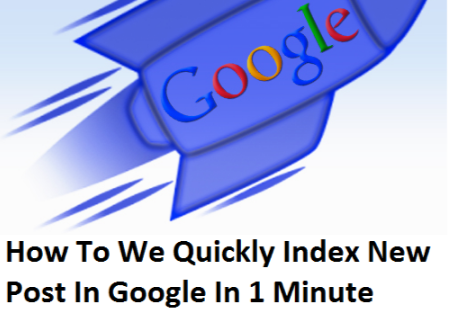HOW TO GET FAST INDEX FOR NEW WEBSITE IN JUST ONE CLICK
This is very big problem for new website that they are not able to index so i am trying to solve these problems "how to get fast index for new website in just one click" .
Whenever you create a new website or blog for your business, the first thing you probably want to happen is have people find it. And, of course, one of the ways you hope they will find it is through search. But typically, you have to wait around for the Googlebot to crawl your website and add it (or your newest content) to the Google index.
How to Get Fast Index Your New Website or Blog
Submit your blog to google webmaster tool
So how can you get your new website discovered by the Googlebot? Here are some great ways. The best part is that some of the following will help you get referral traffic to your new website too!
Create a Sitemap – A sitemap is an XML document on your website’s server that basically lists each page on your website. It tells search engines when new pages have been added and how often to check back for changes on specific pages. For example, you might want a search engine to come back and check your homepage daily for new products, news items, and other new content. If your website is built on WordPress, you can install the Google XML Sitemaps plugin and have it automatically create and update your sitemap for you as well as submit it to search engines. You can also use tools such as the XML Sitemaps Generator.
Submit Sitemap to Google Webmaster Tools – The first place you should take your sitemap for a new website is Google Webmaster Tools. If you don’t already have one, simply create a free Google Account, then sign up for Webmaster Tools. Add your new site to Webmaster Tools, then go to Optimization > Sitemaps and add the link to your website’s sitemap to Webmaster Tools to notify Google about it and the pages you have already published. For extra credit, create an account with Bing and submit your sitemap to them via their Webmaster Tools.
Install Google Analytics – You’ll want to do this for tracking purposes regardless, but it certainly might give Google the heads up that a new website is on the horizon.
Submit Website URL to Search Engines – Some people suggest that you don’t do this simply because there are many other ways to get a search engine’s crawler to your website. But it only takes a moment, and it certainly doesn’t hurt things. So submit your website URL to Google by signing into your Google Account and going to the Submit URL option in Webmaster Tools. For extra credit, submit your site to Bing. You can use the anonymous tool to submit URL’s below the Webmaster Tools Sign In – this will also submit it to Yahoo.
Create or Update Social Profiles – As mentioned previously, crawlers get to your site via links. One way to get some quick links is by creating social networking profiles for your new website or adding a link to your new website to pre-existing profiles. This includes Twitter profiles, Facebook pages, Google+ profiles or pages, LinkedIn profiles or company pages, Pinterest profiles, and YouTube channels.
Share Your New Website Link – Once you have added your new website link to a new or pre-existing social profile, share it in a status update on those networks. While these links are nofollow, they will still alert search engines that are tracking social signals. For Pinterest, pin an image from the website and for YouTube, create a video introducing your new website and include a link to it in the video’s description.
Bookmark It – Use quality social bookmarking sites like Delicious and StumbleUpon.
Create Offsite Content – Again, to help in the link building process, get some more links to your new website by creating offsite content such as submitting guest posts to blogs in your niche, articles to quality article directories, and press releases to services that offer SEO optimization and distribution. Please note this is about quality content from quality sites – you don’t want spammy content from spammy sites because that just tells Google that your website is spammy.

Wonderful post Thank you for sharing this article. I'm definitely going to implement these suggestions wherever I need to. Really helpful
ReplyDeleteBLOG CONTENT